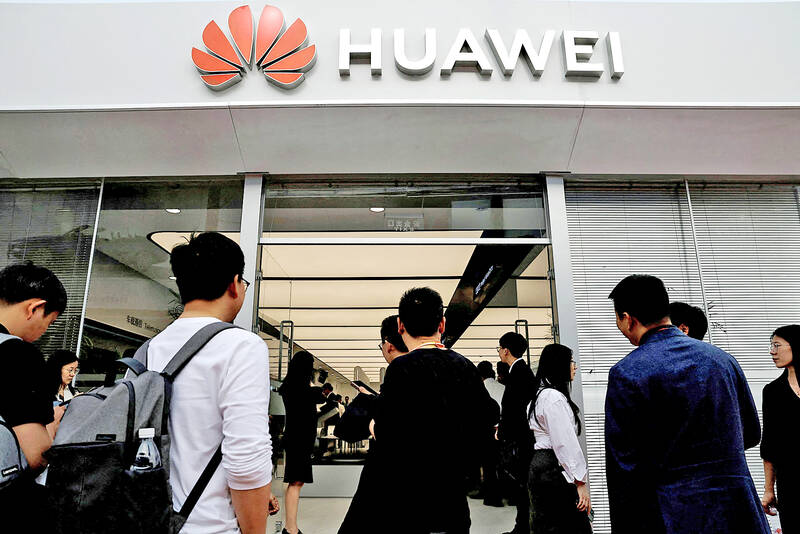The US has revoked licenses allowing Huawei Technologies Co (華為) to buy semiconductors from Qualcomm Inc and Intel Corp, people familiar with the matter said, further tightening export restrictions against the Chinese telecom equipment maker.
Withdrawal of the licenses affects US sales of chips for use in Huawei phones and laptops, said the people, who discussed the move on condition of anonymity.
US House of Representative Committee on Foreign Affairs Chairman Michael McCaul confirmed the administration’s decision in an interview on Tuesday.

Photo: Reuters
He said the move is key to preventing China from developing advanced artificial intelligence.
“It’s blocking any chips sold to Huawei,” said McCaul, a Texas Republican who was briefed about the license decisions for Intel and Qualcomm. “Those are two companies we’ve always worried about being a little too close to China.”
While the decision might not affect a significant volume of chips, it underscores the US government’s determination to curtail China’s access to a broad swathe of semiconductor technology.
Officials are also considering sanctions against six Chinese firms that they suspect could supply chips to Huawei, which has been on a US trade restrictions list since 2019.
Intel expects revenue to fall “below the midpoint” of its previously guided range of US$12.5 billion to US$13.5 billion in the second quarter due to the ban, it said in a statement yesterday.
Intel shares fell 2.4 percent to US$29.95 at 9:32am in New York. Shares of Qualcomm and rival chipmakers Advanced Micro Devices Inc and Nvidia Corp also declined following Intel’s announcement.
Withdrawing the export licenses is “economic coercion” and violates WTO rules, the Chinese Ministry of Commerce said in a statement yesterday.
The US Department of Commerce confirmed the withdrawal of “certain licenses” for exports to Huawei, but declined to offer specifics.
US President Joe Biden’s administration has come under pressure to do more to stop Huawei and other Chinese tech companies after signs of progress in the country’s semiconductor development.
“We continuously assess how our controls can best protect our national security and foreign policy interests,” the agency said in a statement on Tuesday.
Qualcomm recently said that its business with Huawei is already limited and would soon shrink to nothing. It has been allowed to supply the Chinese company with chips that provide older 4G network connections. It is prohibited from selling ones that allow more advanced 5G access.
Huawei does not rank in Qualcomm’s list of top 10 customers, a Bloomberg supply chain analysis shows. It also does not feature in Intel’s list of top customers.
The US is also pressing allies, including Japan, the Netherlands, South Korea and Germany, to tighten curbs on selling and maintaining chip manufacturing tools in China — with Huawei as the main target of that effort.
McCaul and other Republican lawmakers, including Senator Marco Rubio, have urged the commerce department to revoke licenses for companies to sell chips to Huawei. Their calls escalated after Huawei in August last year unveiled a smartphone powered by an advanced, made-in-China processor.
The Biden administration has opened a probe into the “purported” 7-nanometer chip, which a Bloomberg teardown revealed was made by Chinese chipmaker Semiconductor Manufacturing International Corp (中芯).
The chip was manufactured using Dutch and American technology, Bloomberg has reported, indicating that China is still reliant on foreign tools to produce its most advanced semiconductors despite Beijing’s efforts to build a full domestic supply chain.

Intel Corp chief executive officer Lip-Bu Tan (陳立武) is expected to meet with Taiwanese suppliers next month in conjunction with the opening of the Computex Taipei trade show, supply chain sources said on Monday. The visit, the first for Tan to Taiwan since assuming his new post last month, would be aimed at enhancing Intel’s ties with suppliers in Taiwan as he attempts to help turn around the struggling US chipmaker, the sources said. Tan is to hold a banquet to celebrate Intel’s 40-year presence in Taiwan before Computex opens on May 20 and invite dozens of Taiwanese suppliers to exchange views

Application-specific integrated circuit designer Faraday Technology Corp (智原) yesterday said that although revenue this quarter would decline 30 percent from last quarter, it retained its full-year forecast of revenue growth of 100 percent. The company attributed the quarterly drop to a slowdown in customers’ production of chips using Faraday’s advanced packaging technology. The company is still confident about its revenue growth this year, given its strong “design-win” — or the projects it won to help customers design their chips, Faraday president Steve Wang (王國雍) told an online earnings conference. “The design-win this year is better than we expected. We believe we will win

Chizuko Kimura has become the first female sushi chef in the world to win a Michelin star, fulfilling a promise she made to her dying husband to continue his legacy. The 54-year-old Japanese chef regained the Michelin star her late husband, Shunei Kimura, won three years ago for their Sushi Shunei restaurant in Paris. For Shunei Kimura, the star was a dream come true. However, the joy was short-lived. He died from cancer just three months later in June 2022. He was 65. The following year, the restaurant in the heart of Montmartre lost its star rating. Chizuko Kimura insisted that the new star is still down

While China’s leaders use their economic and political might to fight US President Donald Trump’s trade war “to the end,” its army of social media soldiers are embarking on a more humorous campaign online. Trump’s tariff blitz has seen Washington and Beijing impose eye-watering duties on imports from the other, fanning a standoff between the economic superpowers that has sparked global recession fears and sent markets into a tailspin. Trump says his policy is a response to years of being “ripped off” by other countries and aims to bring manufacturing to the US, forcing companies to employ US workers. However, China’s online warriors